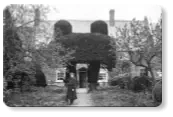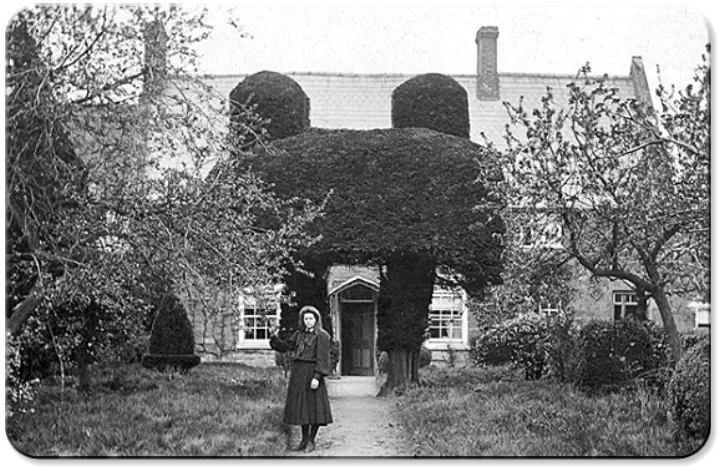By the autumn of 1901 the farm was running smoothly and a routine had been
established when Peake began to notice that the amount of milk that he was carrying up
to the house was considerably less than it should have been. His first thought was that
the cows were affected by a physical or digestive upset and he examined them closely to
establish the cause. However, the cows seemed to be in good health with normal
appetites so he checked on the rations they were being given but found that these were
correct and were being consumed. He walked the pasture that the cows were grazing to see if any ragwort of
other noxious weed had become established. Although he did not expect to find any such weeds as the pasture
was well managed and grazed, he examined thoroughly as he was becoming more and more perplexed as to the
cause of the problem. He reluctantly began to suspect that the cows were being clandestinely milked during the
night. It was not unknown for gypsies or unscrupulous people to take milk in this way from cattle housed in
isolated buildings. On examining the cows' udders before they were milked in the morning he found that they
contained considerably less milk than they should have done. (The morning yield of milk is always greater than
that in the afternoon because of the longer time between milkings, twelve to fourteen hours between evening and
morning but only eight or nine between morning and evening.)
He therefore reported his suspicions to my grandmother who, after questioning him about the investigations he
had undertaken, asked him to arrange for the village policeman to call and see her. Peake soon found him
patrolling the village and he immediately returned with Peake to Yew Tree House. After questioning both Peake
and Grandmother he agreed that the suspicions were probably correct and undertook to apprehend the
miscreants. In those days, when each village had its own policeman, the constable knew everybody in the village
and more about them and their movements than anyone else. He asked Peake if there was anyone he particularly
suspected and in reply Peake named two men from a large family, said to have gypsy blood in their make-up, who
had previously been convicted of minor offences such as poaching and theft of tools and farm produce etc.. There
were, at that time, a number of men who would not accept regular employment on a farm, preferring to take on
work for different farmers on a piecework basis, striking a bargain with each individual farmer who needed work
done. The sort of jobs they would take being hedge-cutting and dyking in the winter and root hoeing, hay making
and harvesting in the summer. Both the men under suspicion had been employed on this basis on the farm from
time to time and knew the stock that were kept and the layout of the buildings. The constable agreed to keep
watch and apprehend whoever was responsible. Although he already knew a good deal about his suspects and
their movements, he kept particular watch on them for a day or so and then set his trap.
He patrolled the village as usual during the evening and visited each of the three pubs to check that they were
closing at the correct time. He then walked quietly down to the Bottom Yard and, entering the paddock by the
gate on Middle Street (Church Street) and using the cover of the hedge bordering the next-door orchard, managed
to get within about thirty yards of the shed where the cows were housed and settled down to wait. After some
time he heard the latch being lifted on the main gate leading to Manor Lane and saw two figures enter the yard.
After pausing to ensure all was quiet they moved to the fold-yard where he cows were tied and, opening the gate,
went inside. After allowing them three or four minutes to settle to their work the constable emerged from cover
and ran across towards the yard shouting to the men that they were under arrest and to stand still. Of course, the
men dropped their buckets and made a bolt for the road gate which they had left unlatched. Due to the distance
the constable had to cover they had reached the gate by the time that he caught up with them and one managed
to slip through before the constable slammed the gate, trapping the second man. Once trapped, the second man
offered no further resistance and, having handcuffed him, the constable marched him to Yew Tree House and left
him in Grandmother's custody whilst he pursued the man who had escaped. Under today's conditions this may
seem a risky procedure but the man was well known to my grandmother, as she was to him, and being
handcuffed to the kitchen range, escape was impossible. To pass the time she asked what they had been doing in
the yard, to which he replied that they had only been looking for sparrows' nests.
Meanwhile the constable, knowing full well the identity of the other man went to his home to enquire his
whereabouts and was told that he had was not at home, having walked to Melton Mowbray to visit his sister.
The constable walked back to Manor Lane and, having secured the gates, collected the buckets the men had
dropped; returned to Yew Tree House; collected his prisoner; marched him down to Oakham Police Station and
left him and the buckets in the charge of the officer on duty.
The following day being a Sunday the constable's duties were somewhat lighter but he kept a discreet eye on the
cottage where the men lived and towards evening walked up through the village and along the Melton Road. He
concealed himself behind a bush and settled down to wait. Quite soon, just as the bells were ringing for evening
service, he saw his man walking along the road towards the village and, stepping out, arrested him and marched
him down to Oakham Police Station to be lodged in the cells with his brother.
They were brought before the magistrates the following week and Grandmother, Peake and the constable were all
called to give evidence. After due deliberation the men were convicted and each sentenced to three months
imprisonment. By today's standards this would appear to be a harsh punishment for what was a fairly minor
offence but in those days magistrates were more concerned to protect honest people than with the rehabilitation
of offenders.




Langham Village History Group ~ © 1996 - 2025
The Milk Theft (2) - Don Mantle




By the autumn of 1901 the farm was running smoothly and a routine had been
established when Peake began to notice that the amount of milk that he was carrying up
to the house was considerably less than it should have been. His first thought was that
the cows were affected by a physical or digestive upset and he examined them closely to
establish the cause. However, the cows seemed to be in good health with normal
appetites so he checked on the rations they were being given but found that these were
correct and were being consumed. He walked the pasture that the cows were grazing to see if any ragwort of
other noxious weed had become established. Although he did not expect to find any such weeds as the pasture
was well managed and grazed, he examined thoroughly as he was becoming more and more perplexed as to the
cause of the problem. He reluctantly began to suspect that the cows were being clandestinely milked during the
night. It was not unknown for gypsies or unscrupulous people to take milk in this way from cattle housed in
isolated buildings. On examining the cows' udders before they were milked in the morning he found that they
contained considerably less milk than they should have done. (The morning yield of milk is always greater than
that in the afternoon because of the longer time between milkings, twelve to fourteen hours between evening and
morning but only eight or nine between morning and evening.)
He therefore reported his suspicions to my grandmother who, after questioning him about the investigations he
had undertaken, asked him to arrange for the village policeman to call and see her. Peake soon found him
patrolling the village and he immediately returned with Peake to Yew Tree House. After questioning both Peake
and Grandmother he agreed that the suspicions were probably correct and undertook to apprehend the
miscreants. In those days, when each village had its own policeman, the constable knew everybody in the village
and more about them and their movements than anyone else. He asked Peake if there was anyone he particularly
suspected and in reply Peake named two men from a large family, said to have gypsy blood in their make-up, who
had previously been convicted of minor offences such as poaching and theft of tools and farm produce etc.. There
were, at that time, a number of men who would not accept regular employment on a farm, preferring to take on
work for different farmers on a piecework basis, striking a bargain with each individual farmer who needed work
done. The sort of jobs they would take being hedge-cutting and dyking in the winter and root hoeing, hay making
and harvesting in the summer. Both the men under suspicion had been employed on this basis on the farm from
time to time and knew the stock that were kept and the layout of the buildings. The constable agreed to keep
watch and apprehend whoever was responsible. Although he already knew a good deal about his suspects and
their movements, he kept particular watch on them for a day or so and then set his trap.
He patrolled the village as usual during the evening and visited each of the three pubs to check that they were
closing at the correct time. He then walked quietly down to the Bottom Yard and, entering the paddock by the
gate on Middle Street (Church Street) and using the cover of the hedge bordering the next-door orchard, managed
to get within about thirty yards of the shed where the cows were housed and settled down to wait. After some
time he heard the latch being lifted on the main gate leading to Manor Lane and saw two figures enter the yard.
After pausing to ensure all was quiet they moved to the fold-yard where he cows were tied and, opening the gate,
went inside. After allowing them three or four minutes to settle to their work the constable emerged from cover
and ran across towards the yard shouting to the men that they were under arrest and to stand still. Of course, the
men dropped their buckets and made a bolt for the road gate which they had left unlatched. Due to the distance
the constable had to cover they had reached the gate by the time that he caught up with them and one managed
to slip through before the constable slammed the gate, trapping the second man. Once trapped, the second man
offered no further resistance and, having handcuffed him, the constable marched him to Yew Tree House and left
him in Grandmother's custody whilst he pursued the man who had escaped. Under today's conditions this may
seem a risky procedure but the man was well known to my grandmother, as she was to him, and being
handcuffed to the kitchen range, escape was impossible. To pass the time she asked what they had been doing in
the yard, to which he replied that they had only been looking for sparrows' nests.
Meanwhile the constable, knowing full well the identity of the other man went to his home to enquire his
whereabouts and was told that he had was not at home, having walked to Melton Mowbray to visit his sister.
The constable walked back to Manor Lane and, having secured the gates, collected the buckets the men had
dropped; returned to Yew Tree House; collected his prisoner; marched him down to Oakham Police Station and
left him and the buckets in the charge of the officer on duty.
The following day being a Sunday the constable's duties were somewhat lighter but he kept a discreet eye on the
cottage where the men lived and towards evening walked up through the village and along the Melton Road. He
concealed himself behind a bush and settled down to wait. Quite soon, just as the bells were ringing for evening
service, he saw his man walking along the road towards the village and, stepping out, arrested him and marched
him down to Oakham Police Station to be lodged in the cells with his brother.
They were brought before the magistrates the following week and Grandmother, Peake and the constable were all
called to give evidence. After due deliberation the men were convicted and each sentenced to three months
imprisonment. By today's standards this would appear to be a harsh punishment for what was a fairly minor
offence but in those days magistrates were more concerned to protect honest people than with the rehabilitation
of offenders.



Langham Village History Group ~ © 1996 - 2025















![Close [x]](index_htm_files/close.png)










































